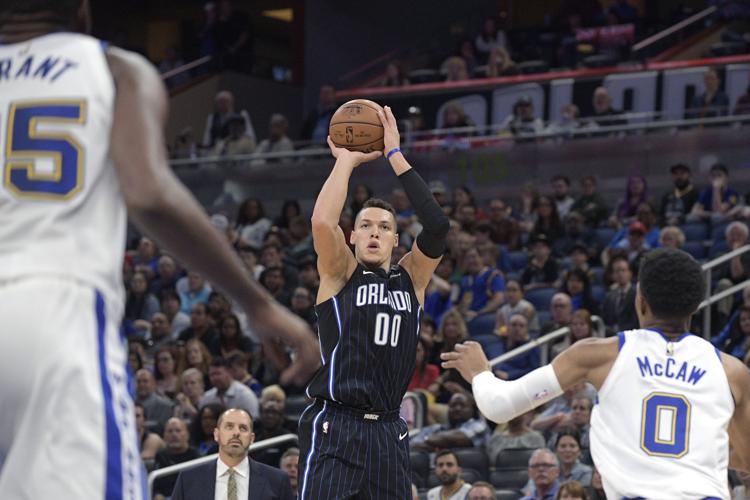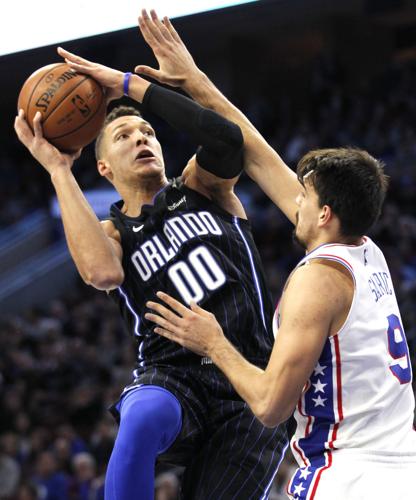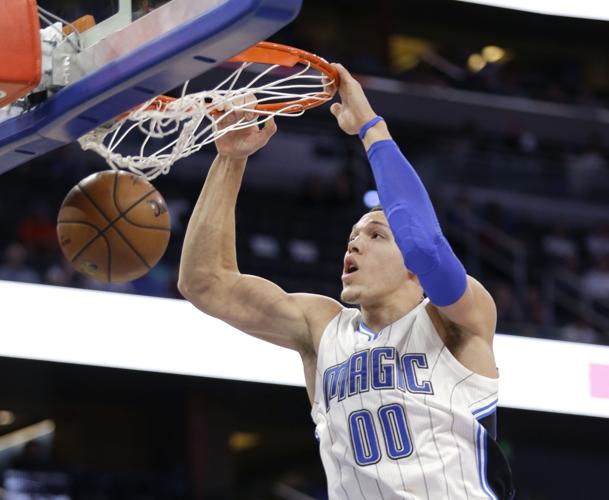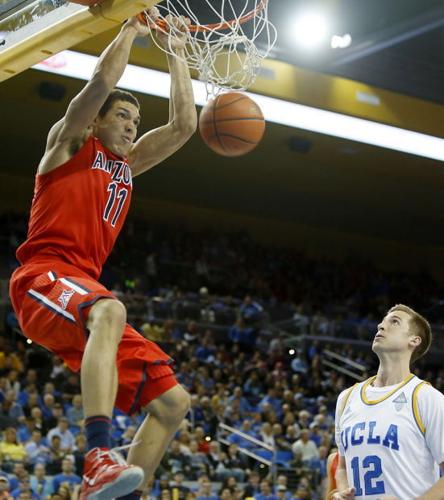NEW YORK — Aaron Gordon is not about to fall into your trap.
First of all, Gordon is 6 feet 9 inches tall, weighs 220 pounds and is as chiseled as a Rodin sculpture, so good luck trapping him in the first place. To quote “Jaws,” you’re gonna need a bigger boat.
But we’re not even talking about trap defense here. We’re talking about trap offense. As in, the trap a basketball player can fall in when he finally finds his shot.
Gordon has found his. Twice this season, his fourth in the NBA after one nearly magical year at Arizona, Gordon has gone off for 40-plus points. His newfound scoring prowess has become the talk of the NBA.
It’s enough to make a guy trigger-happy. Trigger-ecstatic, even.
But Gordon’s got his guard up, even if opposing defenses haven’t had theirs.
“Statistics, that’s for everybody else,” said Gordon, perched in his stall in the visitor’s locker room at Madison Square Garden on a recent Sunday night, after his Magic defeated the host Knicks, 105-100, their second win in three games after nine straight losses.
“That’s not for me. Percentages, not for me. Analytics, not for me. It’s for the fans, it’s for the coaches, for GMs. For everybody. Not me. Looking at your numbers, playing into that, that’s undisciplined. It allows you to be complacent. You’ve still got to come out and recreate it, every single night.
“You’re only as good as your last game, that’s how I look at it.”
•••
Gordon seems distracted.
Still baby-faced and fresh, four years removed from his lone college basketball season — Arizona’s Elite Eight run alongside Nick Johnson and T.J. McConnell in 2013-14 — Gordon scrolls through Instagram when another reporter walks up.
The reporter asks his question — about Orlando’s fourth-quarter funk against the Knicks, who nearly came back from a deficit — and Gordon is still somewhere else.
“Wait — I don’t believe you’re as good as your last game,” he says, correcting his earlier statement before turning back to the new reporter. “Wait, what did you say?”
He’s in his own head for a moment, lost.
It’s just … it’s just that he wants to make it clear that just because he’s found his shot doesn’t mean he’s suddenly going to become a gunner on par with Steph Curry.
His newfound confidence is just that, newly found.
Before this year, he shot — shield your eyes — 27 percent, 30 percent and 29 percent from 3-point range in his first three NBA seasons.
Flash forward to mid-November, and Gordon was leading the league from long-range, starting the season with 25 makes in 42 attempts. He’s cooled off a bit since then — and now may have to sit out a few games after suffering a concussion in a loss to Denver on Friday night — but he’s still shooting 41 percent from behind the arc — but that is still leaps and bounds over his past performance.
And speaking of leaps and bounds, Gordon can still do so with the best of them. He is a two-time Slam Dunk Contest entrant, after all.
Only, he’s no longer just a dunker anymore.
“His perimeter shooting is the biggest thing — it’s opened up a lot for him and teams have had to honor him and run at him,” Magic head coach Frank Vogel said. “We’ve encouraged him to become a 3-point shooter. He can do all the opportunistic things at the rim because of it.”
It seems he has the green light from his head coach, but one conversation with Gordon and it sounds like he’s stuck at a stale yellow.
“I look to be aggressive, but I take what the game gives me,” he said. “Some nights there are going to be explosions and some nights, not so much. I want to maintain ruthlessness. But the numbers game is a trap. I don’t play the numbers game. I play a different game.”
•••
On this night, against a Knicks team missing its two best players — power forward Kristaps Porzingis and shooting guard Tim Hardaway Jr. — Gordon’s shot is lost again.
He’ll score 10 points on 3-of-11 shooting, including 1 for 6 from 3-point range, a particularly disappointing showing given that with Porzingis out, Michael Beasley — nobody’s idea of an all-world defender — draws Gordon as an assignment.
But he’ll do a very many other Gordon-like things, which will draw rave reviews from his teammates. He’ll grab four rebounds, dish four assists, pick up two steals and play his typically feisty defense from the power forward spot that prompted the Magic to draft him at the No. 4 spot in the 2013-14 NBA Draft. He’ll play his game.
“He’s got a chance to be one of the more complete players in the NBA,” his teammate, long-time NBA mainstay Arron Afflalo, will say after the win.
And Afflalo would know.
Later he’s asked how many fellows NBAers have squandered their natural gifts by not putting in the commensurate amount of work, and Afflalo shakes his head before saying, “The work is the separation. A lot of the guys in this league are very talented, but over the years, it’s the guys who put in the consistent work who get the results.
“And Aaron is going to be a product of that.”
Afflalo, a former UCLA star, sees it on a daily basis, and even more, he sees it as the two sail through the heavens.
Afflalo sits next to Gordon on Orlando’s team flights, and he’s seen his younger compatriot develop into what he describes as “a student of the game.” They pore over video together, discerning tendencies, picking out holes in their own games.
“He wants to be great, man,” Afflalo said. “He wants to be great.”
His teammates and coaches echo the sentiment.
“I’ve been here since he’s got here, and I’ve seen him develop,” said center Nikola Vucevic, like Gordon and Afflalo, a former Pac-12 product from USC. “He’s a completely different player than when he came into the league. He’s been able to play at a slower pace, reads the defenses better, takes his time when he needs to go into a move.”
“He’s been doing it for four years, and people don’t know that,” added Vogel, who took over as Orlando’s head coach in 2016. “The first three years, he had an injury to start the season, and when you don’t have September and October to really get your legs under you, you’re really playing uphill the rest of the way.
“This is really the first season he’s started healthy, and that, with the cumulative effect of his work over the years, is paying off.”
•••
The proof is in the trajectory.
As a rookie — a season in which he missed 35 games, 32 of them because of a broken bone in his foot — Gordon averaged 5.2 points and 3.6 rebounds in 17 minutes per game.
In his second season, those numbers rose to 9.2 points and 6.5 rebounds in 24 minutes per game, with 37 starts.
Last year — which would’ve been his senior year at Arizona if this were 1988 or something — Gordon improved to 12.7 points in 29 minutes per game.
This year through 24 games: 18.7 points and 8.3 rebounds in 34 minutes per game, of which he’s started all 24.
It’s not lost on Gordon that his progression coincides with what would’ve been his college career. Still just 22 years old, he could be a rookie out there, if the NBA Draft hadn’t become more about potential than production.
“It’s taken me a little bit of maturing,” he admits. “It took me until the end of last year to realize the work you put in is the work you get out.
“I was 18 in the league, the youngest in my draft, and I got a head start. I’ve got four years into this league, so I’ve learned a little how it works. But I’m still trying to figure it out.”
So much of the work he’s described has revolved around his shot.
Afflalo attests to the hours he puts in — “He stays after games, stays after practice; he wants to be able to take and make the shots he gets in the game,” — and not just physically, but mentally.
“He’s been doing a better job reading the game, seeing what the defense is giving him, and experience — and maturity — helps with that a lot,” Vucevic said. “If you add the skillset, it’s much easier. It’s good to see his work is paying off.”
The mental side of things is where Gordon has made, and will make, the most improvement. Not only by getting into the finer points of basketball, but by getting out of his own head.
“It’s a detachment,” Gordon said. “When you shoot the ball, you let it fly, and that’s all you can do. Whether it goes in or not, who knows? I think it’s going in. I know it’s going in. That’s all I can do. It’s a healthy detachment.”
A healthy detachment for Gordon, who is finally living up to the promise that Wildcat fans saw up-close-and-personal four years ago.
And an unhealthy thought for the rest of the NBA.







